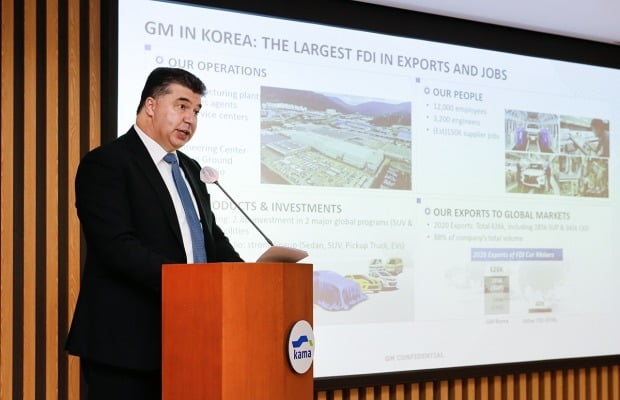“Korea is lagging behind certainty of labor practices and regulations”
“Spanish labor cost is 62% of Korea”

GM Korea President Kaher Kazem is speaking about the competitiveness of the Korean market. Photo = GM Korea
GM Korea and Renault Samsung Motors, which are foreign direct investment (FDI) companies in the automobile industry, made a’competitive remark’ on labor competitiveness in the Korean market. It is pointed out that regulation, labor-management conflict, and labor costs act as obstacles to investment.
On the 28th, GM Korea President Kaher Kazem attended the ‘8th Industrial Development Forum and the 12th Automotive Industry Development Forum’ and made a presentation on the subject of’Suggestions on Improving Korea’s Competitiveness to Attract Foreign-Invested Companies’.
“GM Korea is the largest foreign direct-invested company in Korea,” said Mr. Kazem, and said, “We employed over 12,000 employees in Korea and exported 285,000 vehicles last year.”
He praised the Korean market, saying, “It has the advantages of a free trade agreement (FTA), a stable economy, a manufacturing capacity and a competitive supply base,” and said, “In particular, the engineering field is very specialized.” He explained that 19 Korean suppliers were included in 116 of GM’s’Partners of the Year’ selected by GM in 2019, and that the domestically produced Buick Encore (Chevrolet Trax brother model) was also selected as the most reliable product in the 2020 North American Consumer Report. .
However, the disadvantages of the Korean market were labor-management relations and labor practices and regulations. “Conflicting labor-management relations, short labor-management negotiation cycles, and uncertain labor policies are challenges to be solved,” Kazem said.

The Korean GM union had a partial strike last year. Photo = GM Korea Branch of the National Metal Workers’ Union
“Stable labor-management relations, economic conditions, flexibility and certainty of supply are key to making investment decisions,” he said. He presented the results of the’Global Competitiveness Report’, which was surveyed by the World Economic Forum (WEF) in 141 countries around the world.
According to the 2019 report, Korea’s overall national competitiveness ranked 13th, but the production and labor market competitiveness ranked 59th and 51st, respectively. “In particular, if we look carefully at the competitiveness of the labor market, the labor flexibility was ranked 97th,” said Kazem. “The labor flexibility category includes labor-management relations, flexibility in wage decisions, and flexibility in employment and internal conversion arrangements.”
“Compared to major advanced countries, labor practices and regulatory certainty are also lagging.” It is a factor that makes it difficult.” It is pointed out that the conflict is repeated as negotiations are frequent, strikes are easy, and union executives are changing quickly.

The Renault Samsung labor union held a rally in front of the Renault Samsung headquarters in Gangnam-gu, Seoul in January last year. Photo = Reporter Lee Mi-kyung, Hankyung.com
At this meeting, Renault Samsung also mentioned the possibility of leaving Korea and pointed out regulations, labor costs, and taxes as problems.
Christophe Butte Renault Chief Financial Officer (CFO) of Samsung said, “The labor cost of the Spanish factory is 62% of that of the Busan factory,” he said. “If the same car is produced in Spain, it is $1,100 cheaper than Korea.” It is interpreted as a remark with the in mind of the Spanish factory Valladolid, which is a competitor of the Busan factory. He added, “If the Busan plant receives new cars and wants to increase production, it has to increase its competitiveness.”
He then evaluated that Korea is lagging behind Spain in terms of regulations and taxes. Bute CFO said, “Korea’s environmental regulations are the strongest in the world, and there are redundant penalties. It is the worst for automakers,” he said. Korea’s corporate tax is 27.5%, which is higher than the OECD average of 23.5%. The property tax is also 3% higher than that of Spain, which is 2%.
Bute CFO said, “Renault Samsung recorded the worst output last year and faced a big challenge.” Renault Samsung’s last year’s production amounted to 11,6166 units. Considering that the Busan plant’s annual production capacity is 250,000 units, the plant utilization rate is less than half.
Sesung Oh, reporter of Hankyung.com [email protected]
Article reports and press releases [email protected]
